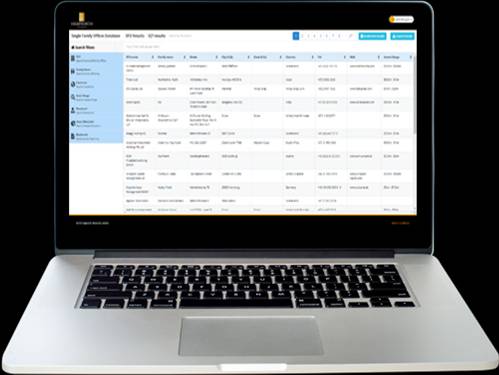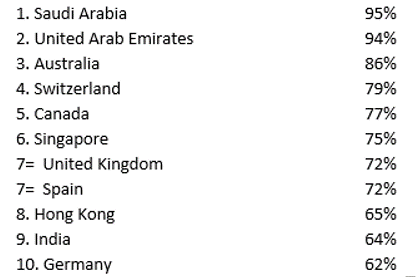Family Office
EXCLUSIVE: Single Family Offices' Real Estate Investments: The Shadow Of COVID-19

In exclusive data provided by Highworth Research, this news service examines real estate investment activity of single family offices, mainly in Europe. The data brings some possibly surprising facts to light.
Single family offices have long regarded investment in real
estate as a core element in their overall portfolio. Statistics
from the Global Single Family Offices Database from Highworth
Research and WealthBriefing – which is media partner to
this organisation - show that the asset class ranks third in
family offices’ allocation preferences, with 74 per cent of
family offices globally outside the US investing in property. (To
receive information about accessing the Highworth
Research database, click
on this link.)
Only private equity and public equities rank more highly, with
respectively 83 per cent and 76 per cent of single family offices
allocating to these asset classes.
Top ten countries for family office real estate
investment
Does allocation to real estate vary by country? The Single Family
Offices Database shows the following percentages of SFOs in each
of the top 10 countries allocating to real estate:
SFOs allocating to real estate

There are some interesting takeaways from this list:
-- If the oil price recovers the Gulf states may not have a
problem with overweight allocation to real estate except for
Dubai where the economy is excessively dependent on inflows of
tourists to sustain the hotels sector and expat businessmen to
rent apartments;
-- It is surprising that Hong Kong is not higher on the list
given the enormous value of property in the territory;
and
-- German SFOs appear to have a healthy, well-balanced
approach to real estate investment – not too much, not too
little.
Winners and losers among property investment
sectors
Does family office investment in real estate vary by property
sector? At a time when the coronavirus overshadows most
investment decisions, real estate has winners and losers
depending on sectors. The Single Family Offices Database can be
interrogated to show which SFOs invest in which property sectors,
and therefore which may be facing enhancement or impairment of
the value of their property investments.
Family offices which hold investments in offices, retail, mixed
use, and hospitality, will have serious concerns at present.
Those which have investments in logistics and warehousing,
agricultural land, some types of residential property, and
certain specialised property micro-markets, will be more
relaxed.
Investment in office property
COVID-19 has made many companies re-think their approach to the
need for office space. Jes Staley, CEO of Barclays, has said that
placing “7,000 people in a building may be a thing of the past.”
Land Securities plc, with a property portfolio valued at £12.8
billion ($15.2 billion), reported on 12 May that only 10 per cent
of the company’s offices were occupied. The new normal of home
working may continue to a large degree in the future.
The outstanding example of a family office investing at
substantial scale in the international office property market is
Pontegadea, the SFO of Amancio Ortega, the founder of the “fast
fashion” company Inditex. Inditex’ dividends paid to Pontegadea
over the past three years have been well in excess of €1 billion
($1.08 billion) a year, and most of this has been invested in
office buildings in prime locations in Europe and the US. The
family office’s real estate portfolio had a value of €13 billion
in March 2020. Will Mr Ortega’s investment advisors now aim for
greater diversification of his assets post the coronavirus? The
jury is still out.
Investment in retail
Retail real estate, already under threat from online shopping
before the virus hit, now has to cope with the double whammy of
the lockdown keeping consumers away from many types of store.
Again, Land Securities wrote down the value of its estate by £1.2
billion in May 2020, of which £800 million was due to “the
structural shift from retail” according to CEO Mark Allan, who
claimed, “The virus is expected to accelerate the decline of high
street retail and shopping centres.”
Over the past 20 years single family offices have been big
investors in shopping malls in certain countries. In Dubai Majid
Al Futtaim is the largest developer and operator of malls across
the Gulf and North Africa, running 21 malls. Al Ghurair
Investments follows close behind. If tourist and expat flows to
the Mideast diminish over the next few years, that concentration
of family capital in retail real estate will become a major
issue.
In Australia, family capital has long been invested in shopping
malls but there’s an interesting difference. LFG Holdings, also
known as the Lowy Family Group, is the family office of Frank
Lowy. The core of the family’s wealth lay in Westfield Corp,
developing malls internationally, and Scentre Group, developing
malls in Australia and New Zealand. In 2017 the Lowy family sold
out their 4.07 per cent stake in the listed Scentre Group, and
again in December 2017, sold Westfield to Unibail-Rodamco for
$24.7 billion, retaining a 2.5 per cent stake in the enlarged
group but taking the bulk of their sale proceeds in cash.
Similarly, Australian Sam Alter, whose family office is Albany
Capital Investors, sold a 50 per cent stake in two of his largest
malls in July 2018 for $692 million.
Foresight? Lucky timing? Whichever it was, two of the biggest
mall owners in Australia will be largely unharmed by the impact
of either COVID-19 or online shopping on retail malls.
Hotels and hospitality
Hotel ownership has always been a favourite real estate sector
for some family offices. There are 121 family offices, or 13 per
cent of the current total of SFOs on the Highworth Single
Family Offices Database, which have investments in hotels. Having
to shutter those assets at the present time is painful.
But one or two avoided the problem, among them a family trust
associated with Ellerman Investments, the family office of the
Barclay brothers. In 1995 the Barclay family purchased the London
Ritz for £75 million. In March 2020, a few days before the virus
lockdown began, the family, despite internal dissension, sold the
Ritz to an unidentified Qatari investor for a price reported to
be in the range of £700 million - £900 million.
Family office resilience to real estate
impairment
There are two main reasons why those family offices which are
exposed to what are currently the weakest segments of the global
real estate market, will not suffer lasting financial
damage.
The first is that despite being the third most popular asset
class among family office investors, real estate in most cases is
part of a diversified portfolio of assets. True, a few SFOs are
overly dependent on the most vulnerable types of property which
will take longer to recover from the impact of COVID-19. However
they comprise less than 3 per cent of the total of 930 single
family offices on the Highworth Database.
The second reason is that most single family offices invest for
the long term. Two or three years of severe downturn is tolerable
when seen in the context of a family investment plan designed for
several generations.
In a second article to follow, we will deal with single family
office investment in those sectors of the real estate market
which are proving resilient to the virus' impact.